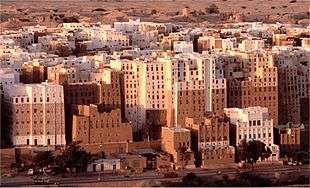Middle East
The Middle East is a region in Western Asia, between the eastern shores of the Mediterranean Sea and the Indian Ocean.
The term "Middle East" was created by the British in the 19th century, and there is no coherent definition; it is a political term as much as geographical, but also Eurocentric, implying that it separates "the West" (Europe) from the Far East.
While the region is known for its arid climate, not all of the land consists of desert. The mountains in Turkey, Iran and Lebanon even have ski resorts. The region is also the cradle of the world's first urban civilizations (especially in Ancient Mesopotamia), and the birthplace of the Abrahamite religions: Judaism, Christianity, and Islam.
Countries and territories
Given the vague and politically-scented definition of the term, some countries and territories are sometimes considered as part of the Middle East and sometimes as part of neighboring areas. Turkey is also considered as part of Europe, while Egypt is also part of North Africa.
Azerbaijan and Armenia are considered part of Europe, even if they have strong historical, geographical, economic, and cultural connections with this region. Iran and Afghanistan are often considered part of the Middle East, but can also be considered to be part of Central Asia or South Asia. Cyprus can also be considered a part of the Middle East but it is generally classified as part of Europe, for political reasons.
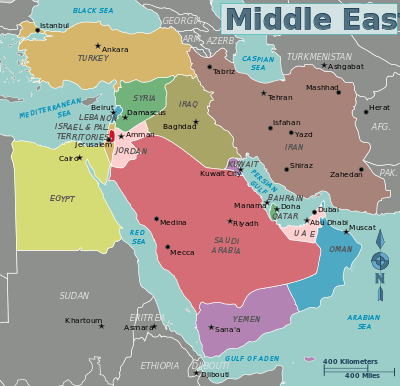
| Bahrain This island state, the smallest of the Gulf emirates, is known in the region as the playground for visitors from its more conservative neighbors. |
| Egypt Home to some of the world's greatest ancient civilizations, Egypt is famous for its outstanding archaeological sites, among them the pyramids, one of which is the only remaining wonder of the ancient world. Tourists who visit the country may also enjoy the shores of the Red and the Mediterranean Seas, as well as the Nile. |
| Iran A country full of historic places, a variety of attractions, and ecosystems that range from deserts in the central and southern parts to beautiful humid forests in the north near the Caspian Sea. Iran is also very ethnically and culturally diverse, and used to be the heart of the Persian Empire. |
| Iraq This cradle of civilization is too dangerous for leisure travel, though more intrepid travellers may find Iraqi Kurdistan a congenial place for a visit. |
| Israel The birthplace of both Judaism and Christianity, with numerous holy sites for Muslims, Druze and Baha'is as well, in addition to places of cultural, historical and prehistoric significance. A small land containing a variety of breathtaking natural views, including deserts, shores and peaks that are covered by snow in the winter, alongside a vibrant nightlife, liberal attitude and a high human and technological development, Israel is a country that combines old and new. |
| Jordan This country, with its vast deserts, also includes fertile land along the East Bank of the Jordan River and its tributaries, such as the Yarmouk, and contains rich archaeological remains, especially in Jerash and Petra, which is one of the new seven wonders of the world; and the extremely salty Dead Sea. |
| Kuwait Probably best known internationally for its brief occupation by Iraq and role in the 1990-1991 Gulf War, Kuwait is an oil-rich emirate that is a destination for laborers and businessmen, generally not for tourists. |
| Lebanon This small country is diverse in culture, religion, politics and terrain. Beirut in particular has been known for the most part as a very liberal city. However, Lebanon's sometimes contentious politics often cause instability in the country. |
| Oman A sultanate that's off the beaten path for most travellers, it is the only country that has a majority of Ibadi Muslims, and it is very rich in beautiful scenery. |
| Palestinian Territories The West Bank is home to historic cities such as Bethlehem, Hebron and Jericho. The Gaza Strip, though also of some historical importance, has restricted access, and is unstable and off-limits for most travelers. |
| Qatar This Arabian peninsula is the world's richest country in term of per capita GDP (PPP). It is probably best known for being the world headquarters of the Al Jazeera media corporation, which is owned by its government, and secondarily, for the striking modern skyline of its capital, Doha. |
| Saudi Arabia This oil-rich desert kingdom, subject to some of the harshest interpretations on Islamic Law in the world, is home to the holiest cities for Muslims: Mecca and Medina. |
| Syria This historic country was part of the Fertile Crescent in ancient times and shows the imprint of all historical periods since, but is in the throes of a bloody civil war that has not only killed a large number of people and displaced even more, but has also involved wholesale looting and destruction of archaeological relics by the so-called Islamic State organization, one of several fighting in Syria. |
| Turkey A very varied country that literally bridges Europe and Asia, it includes the cosmopolitan metropolis of Istanbul, many historical sites, and gorgeous mountains, lakes and coastlines. Until World War I, the Turks had a huge empire, called the Ottoman Empire after its ruling dynasty, and dominated most of the Middle East and large parts of Europe and North Africa for centuries. Soon after the collapse of the empire, Turkey started a process of modernization and secularization, and got closer to the West. As such, it was one of the first and has been one of the few Muslim states to have an official and warm relationship with Israel (that has somewhat cooled), and is NATO ally and a candidate to join the European Union. |
| United Arab Emirates A major hub of oil shipping and foreign labor that includes the famous skylines of Dubai and Abu Dhabi and quieter, more traditional emirates like Sharjah. |
| Yemen This beautiful country, famous for its traditional adobe highrises, fertile highlands and delicious food, is in the throes of a brutal civil war and a very destructive international bombing campaign. |
Cities
- 🌍 Amman — experiencing a massive change from a quiet sleepy village to a bustling metropolis.
- 🌍 Beirut — a true cosmopolitan city, the commercial and financial hub of Lebanon.
- 🌍 Baghdad — once a favoured destination on the 'hippie trail' and packed full of sights, now one of the most dangerous cities on Earth.
- 🌍 Damascus — credited with being the oldest, continuously inhabited city in the world, the old-walled city in particular feels very ancient.
- 🌍 Dubai — most modern and progressive emirate in the United Arab Emirates, boasting many skyscrapers, including the Burj Khalifa, the world's tallest building.
- 🌍 Istanbul — the only major city to span two continents and a fascinating melting pot of East and West.
- 🌍 Jerusalem — containing the UNESCO World Heritage Site of the Old City, this city is sacred for Jews, Christians and Muslims.
- 🌍 Mecca — forbidden for non-Muslims to enter, this is the holiest city in Islam and well known for the Hajj.
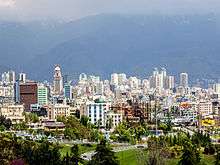
Other destinations
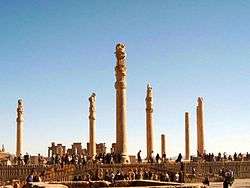
- 🌍 Çatalhöyük- a Stone Age (7500 B.C. to 5700 B.C) settlement of great importance to archaeologists studying the transition from nomadic tribes to settlement and "civilization."
- 🌍 Dead Sea — the water is far too salty for marine life - hence the name - but even the most skeletal humans will easily float.
- 🌍 Empty Quarter — the name Empty Quarter explains pretty well what it is: a vast, inhospitable, empty desert.
- 🌍 Madain Saleh — a Nabataean city in what's now Saudi Arabia, hewed out of rock in the same style as Jordan's far more famous Petra.
- 🌍 Persepolis — the ceremonial capital of the Persian Empire during the Achaemenid dynasty, close to modern Shiraz.
- 🌍 Petra — one of the 'New Seven Wonders', Petra was the breathtaking capital of the Nabataean kingdom from around the 6th century BCE.
- 🌍 Samarra — archaeological and Shi'a holy sites, including the tombs of several Shi'a Imams in Iraq.
- 🌍 Sea of Galilee — known for its Gospel associations with the life and ministry of Jesus Christ, thus a pilgrimage destination for Christians.
- 🌍 Shibam — known as 'Manhattan of the Desert', a unique, sixteenth-century, mud-built, high rise apartment buildings complex in Yemen.
Understand
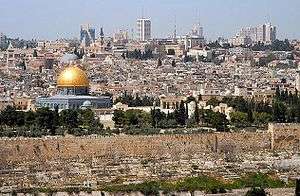
As one of the wellsprings of human civilisation in the ancient and medieval worlds, the birthplace of several world religions (Judaism, Christianity, Islam, Zoroastrianism and the Baha'i faith) and an area of much modern economic and political importance, the Middle East remains a popular destination for travellers.
Ethnically, the region is extremely mixed with people of mainly European and African descent. Today, there is also a very sizeable share of economic migrants coming from Southern and Southeastern Asia, and Sub-Saharan Africa in search of jobs. Arabs, Persians, and Turks are the largest groups, but there are several different ethnic groups, such as Kurds, Armenians, Jews, Azeris and others, each one with their own languages, customs and cultures.
Every country in the Middle East has a Muslim majority (with the notable exception of Israel, which has a Jewish majority), with Iran, Iraq and Bahrain mainly Shia, Oman mainly Ibadi, Saudi Arabia dominated by Salafism and other areas mainly Sunni. The legal systems in most of these countries are influenced by sharia (Islamic law), but very few are entirely based on it.
There are significant communities of native Christians, in particular in Lebanon, Syria, Palestine, Egypt, and Iraq.
Middle Eastern politics is controversial, incredibly complex, often violent and rapidly changeable. Indeed, it is not usually advisable for tourists to engage in political discussion with strangers. The Middle East is one of the most important geopolitical regions in the world. The world's largest oil reserves, conflicts that date back to the dawn of civilization and religious tensions can make the Middle East seem dangerous. While there are strong warnings against travel to Syria and Yemen which are enduring civil wars, news reports do not reflect the day-to-day reality of people going about their normal lives.
Due to substantial oil wealth, the Gulf states are known for providing their citizens with some of the world's most comprehensive welfare states despite not levying any income tax on them.
Cultural geography
North Africa is similar to the Middle East in many ways — language, religion, culture and some ethnic groups. Some writers include Egypt, or even Sudan and Libya, in their use of the term "Middle East". The term MENA refers to the Middle East/North Africa cultural group, which generally extends from Iran or Turkey to as far west as Morocco or Mauritania. It may also include the Red Sea states.
On the other side, Central Asia also has much in common with the Middle East. Ethnic groups and languages are different, but the religion, much of the food, clothing, and architecture are similar. Iran could be counted as part of either region; at one point most of Central Asia was part of the Persian Empire.
The border between southeastern Europe and the Middle East is also unclear. Many writers include Turkey in their usage of "Middle East" and we include it above, but parts of Turkey are very much European. Large parts of Turkey and all of Lebanon and Israel are also clearly Mediterranean regions. On the other hand, several countries usually considered European — Greece, Cyprus and to some extent the Balkans — also have Middle Eastern aspects to their culture.
Get in
By plane
The largest hubs for flights in the region are Dubai Airport, Hamad International Airport (Doha) and Abu Dhabi, with their home carriers, Emirates, Qatar Airways, and Etihad Airways respectively serving every inhabited continent, and having the largest and fastest growing medium to long haul route networks in the world. Istanbul also has good connections from virtually any point in the Middle East, and is served by numerous flights from Europe, North America and East Asia, with Turkish Airlines having a slowly but steadily growing network that is increasingly becoming a viable alternative to the Gulf trio. Ben Gurion Airport is served by flights from most Western countries, although due to the political situation it is not possible to fly from there to anywhere in the Middle East besides Egypt, Jordan and Turkey.
However, there are direct flights from large European hubs to most major cities in the region.
By boat
See Ferries in the Mediterranean. Ferries are available between Greece or Cyprus to Israel, Lebanon and Turkey. Cruises also exist for longer excursions.
By car or bus
Turkey can be reached overland via Greece or Bulgaria.
Border crossings exist between most countries. However, these may be subject to temporary closure depending on political situations. For instance, most crossings into Syria are closed or dangerous. There are no border crossings between Israel and both Lebanon and Syria. Driving a car between counties is dependent on whether cars are allowed into different countries. This is variable across the region.
Get around
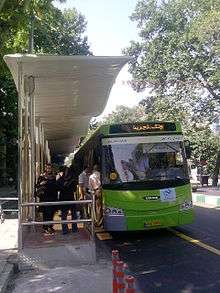
Public transport is poor compared to other regions of the world including other parts of Asia. The majority of locals would use plane or car travel to get between countries. Places where Sunni and Shia areas overlap sometimes lack interlinking transportation.
By plane
Flying is often the best way for getting around. The region is home to many major airports with frequent connections on both budget and legacy carriers. On the other hand, travel overland may not always be safe and even if it is, overland travel may involve crossings of hundreds of kilometers of hot desert.
By car
Driving in the more developed Middle Eastern nations is much like driving in any other developed country - the roads are paved and painted, traffic lights and cameras exist and work at intersections, and most drivers have the same goals you do: to get from Point A to Point B alive. That being said, driving is more reckless than in other developed nations - especially outside of cities - but not so much like in Southeast Asia or parts of Africa. Also, in some countries camels will walk onto the roads, so drivers should remain vigilant even if the road looks safe.
Driving in the less developed nations is more of a challenge, as few roads are paved outside of major cities, and their quality might not be very good.
For the adventurous driver, some countries offer off-road vehicles and trails, such as in wadis (dried-up riverbeds). These trails easily isolate the driver(s), and in the case of emergency (such as a wadi flooding during a storm) it will be hard for authorities to find and help you. Pack everything you need with you for the trip, and never go alone.
Non-Muslim drivers are not allowed to bus or drive in or through the cities of Mecca and Medina in Saudi Arabia. Travellers wishing to go to Jeddah or another port city from the eastern part of the country or vice versa will have to find other routes.
In terms of driving from country to country, you'd have to check out the respective countries' border crossing openings and rules regarding visas and methods of arrival.
By train
Rail travel in the Middle East is limited and whilst most countries have limited passenger services between cities, there is very little between countries. Several countries in the region are, however, expanding their long-neglected rail systems with some starting passenger rail service for the first time in decades or forever. For example, rail service has been expanded in Israel, and a high speed rail project is underway in Saudi Arabia.
Istanbul would normally be the best starting point for rail journeys to a lot of areas in the Middle East, but war in Syria and Iraq and renewed fighting between the Turkish military and PKK terrorists fighting for independence for Turkish Kurdistan and based partly in Iraqi Kurdistan make rail trips to or through those countries questionable if not impossible. However, a service from Istanbul operates to Tehran which includes a 4-hour ferry journey across Lake Van. In general, these trains tend to operate weekly or at most biweekly, but check on current conditions in eastern Turkey before planning your trip.
By bus
This is a more practical option than trains in the Middle East as they are less prone to delays and breakdowns and have far more extensive coverage of the region.
In Saudi Arabia, non-Muslim travellers aren't allowed entry to the cities of Mecca and Medina, and are only allowed in the bus station to switch buses out.
Talk
Arabic is the primary language of the region, and the main language in all Middle Eastern countries except Iran (where Persian predominates), Turkey (Turkish) and Israel (Hebrew, albeit with a significant Arabic-speaking minority). While Standard Arabic is the official language in all Arabic-speaking countries and the medium of instruction in schools, there are also many dialects of Arabic that are the main spoken language in daily life in their respective regions, some of which can be mutually unintelligible.
Kurdish, Azeri, Armenian, Yiddish and several other languages are also spoken in some regions.
English is moderately common in tourist areas but comprehension varies elsewhere. English is understood widely in Israel, Jordan and the Gulf States, especially among educated citizens and in big cities. In Dubai, Doha and Abu Dhabi, foreigners far outnumber the citizen population and as a result, English serves as the lingua franca and is more widely spoken than Arabic. In Turkey, some German is spoken because many Turks have worked in Germany.
Urdu and English are also widely known in Saudi Arabia, Kuwait, Bahrain, Oman, Qatar and UAE as large Pakistani and Indian communities work in these countries. Filipino is also known to some extent, particularly in main cities (Dubai, Abu Dhabi, Riyadh, Doha, etc.), due to a large influx of Filipino migrant workers across the region.
See
If you're interested in remains of some of the world's oldest civilizations, this is the part of the world to head to. The Middle East is also the home of the Abrahamic religions, and there are both older and newer places of worship as well as places mentioned in the holy books to visit. However, in particular in the Gulf states, you can see something completely different. Some of the world's most impressive modern buildings including the world's highest structure, Burj Khalifa, can be found here, together with glitzy malls, artificial islands and some of the world's busiest airports.
On the natural side, the Middle East boasts large desert landscapes, including the Saudi desert (one of the largest in the world) as well as the Lut desert in Iran where the highest surface temperature in the world was measured. Would you rather see some scenic mountain landscapes, head to Iran or Turkey — the former boasts summits more than 5000 m above the sea level and some of the world's highest ski resorts.
Sadly, this is also one of the most volatile parts of the world and many sites are from time to time unsafe to visit.
Itineraries
- From Istanbul to Cairo — classic overland route but virtually impossible due to events in Syria.
- Hajj — the Muslim pilgrimage to Mecca and Medina.
- Ferries across the Red Sea
Do
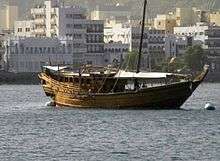
- Explore ancient ruins throughout the region
- Take a ride on a dhow, a traditional wooden fishing boat in the Gulf states
- Visit numerous holy sites in Israel and Saudi Arabia
- Go shopping in traditional souks throughout the region
- Connect with multiple cultures in one of the most diverse regions of the world
Learn
Many universities exist across the Middle East, some of which are highly regarded, including those in Saudi Arabia and Israel. Cairo's Al Azhar University, a famous institute of Islam whose construction predated that of the University of Bologna by over 100 years, is one of the oldest institutions of higher learning in the world.
Opportunities to learn Arabic abound, and are available in both religious and secular settings.
Hebrew instruction is available in Israel through intensive study groups known as Ulpan.
Buy
The Middle East is famous for its markets or souqs. Souqs sell a dizzying array of goods, but each has its own speciality, be it spices or carpets. Notable examples exist in Jerusalem, Damascus and Dubai among many others. Quality varies enormously. Many souqs sell good quality products, but many sell a range of fake or tacky souvenirs. Over-pricing for tourists is common but this can often be counteracted by bargaining.
Haggling
Haggling or bargaining is common across the Middle East. However, its usage is rather complex. In general, haggling is common in markets, but only for certain items. For instance, haggling for souvenirs is acceptable, but not acceptable for food. Also, haggling in shops with fixed prices such as a supermarket is not done. However, in independent stores it may be possible to negotiate a deal if buying multiple or expensive items such as jewellery. When bargaining, it is important to remember that the seller merely wants to maximise their profits. Walking away from an unacceptable deal is considered normal and can prevent pressure selling.
Eat
- See also: Middle Eastern cuisine
Cookery provides obvious evidence of the extent of Middle Eastern influence. Turkish doner kebab, Greek gyros and the shawarma of the Arab countries (everywhere from Oman to Morocco) are all basically the same dish.These are also seen in Central Asia and even China. A traveller going overland from Europe to India will find very similar dishes — notably flat breads and kebabs — in every country from Greece to India. There is a strong theme of fresh, wholesome ingredients. Meat (except pork) is very popular, as are vegetables such as eggplant, chick peas and tomatoes. Many Greek dishes are closer to Iranian cooking than to Italian.
Drink
Turkish coffee, served in small cups is popular throughout the region. Black tea is ubiquitous in Gulf states.
While countries such as Israel and Lebanon have an ancient tradition of wine making, alcoholic beverages are taboo in Muslim countries. Alcohol is banned in Saudi Arabia and the Gulf states, and alcohol will often be confiscated at the airport if found, and is generally not available except in some hotels catering for foreigners.
The main exception to this is in Oman, where foreigners arriving by plane at the Muscat Airport can import up to 2 litres of alcoholic beverages.
On the other hand, alcohol is available in Turkey, Lebanon and Israel, and some of the more cosmopolitan city-states, such as Abu Dhabi and Dubai. Numerous beers are available, as is the stronger Arak, an aniseed liquor.
In lieu of alcohol, stores and restaurants in Muslim countries have a broad selection of fruit juices and soft drinks.
Sleep
Few nations in the Middle East have a vibrant nightlife to go along with excellent hotels. As with any region, quality varies enormously from cheap hostels to the US$15,000 a night grand Atlantis suite in Dubai. Virtually all big cities will have numerous large international chain hotels.
Some of the hotels in more conservative middle Eastern countries will refuse entry to homosexual or unmarried couples, but this tends not to be a problem in popular resorts.
Stay safe
Planning a visit to the Middle East can be complicated in various ways:
- Some countries and territories in the area, such as Iraq, Syria, Yemen and the Gaza Strip, are in a state of war or civil war and should not be visited. See War zone safety if you must go. Also check on current conditions in the Sinai, which has lately experienced a lot of terrorism and fighting between insurgents and the Egyptian military including an apparent downing of a Russian passenger plane, and Southeastern Anatolia (Turkish Kurdistan), where fighting has flared up recently.
- Some countries, such as Saudi Arabia, do not issue tourist visas except for a few expensive tours.
- Many countries in the region do not recognize the state of Israel. These nations may refuse you entry if you have an Israeli visa or an Israeli stamp in your passport, or even a visa for another country that was issued in Israel. Though, under a new system, visitors entering Israel are given special entry cards by the passport control; see the Israel and Visa trouble articles for details. Among the countries in the region, only Turkey, Egypt and Jordan have official relations with Israel, while Oman has been acting as a liaison between Israel and the Arab League, with de facto recognition of Israel.
- The more conservative countries in the region have legislation carrying with heavy penalties (even up to the death penalty) for homosexuality, adultery, fornication, apostasy, proselytizing, and other acts considered as criminal offenses.
- When it comes to petty crime (reckless driving, shoplifting, drug use etc) the penalties in the more conservative countries are high by international standards.
- For most of the area, suggestions in Tips for travel in developing countries apply.
- Some countries, such as Iran, have arrested tourists in the past under charges of espionage and/or sabotage, so be prepared to have your own plan in case this happens, as your embassy or consulate in the country may not be able to help you (if it exists at all) and other legal services may be scarce or not available at all.
Stay healthy
Healthcare varies widely across the region. Generally, large cities will have better hospitals and most doctors will speak English. Hospitals in more rural areas are less likely to be of good quality. Pharmacies are common everywhere except war zones.
Drinking water tends to be safe in richer countries, but less so in Yemen or other poorer areas. Always check before drinking.
Most of the Middle East is arid and dehydration is common, so always drink water more than you think you need to.
Driving in the Middle East is notably more dangerous than in Europe or North America. Road rules may or may not be followed. It is advisable to observe driving standards before taking the plunge with a rental car.
Connect
Go next
- Turkey and Cyprus — with lots of border crossings and extensive transport alternatives, southern Turkey is well linked to the battleground of Syria. It may also be possible to take cruises to the island nation of Cyprus from Syria as well as Lebanon.
- Egypt — with buses from Israel and ferries from Jordan, Egypt is an easy trip from the region.
- South Asia — the "Hippie Trail", after traversing Turkey and Iran from one end to another (and dipping into Iraq at a time in history) goes onward to Pakistan.
- Central Asia — an off the beaten path destination, which is accessible by buses from the Iranian city of Mashhad (which terminate in Turkmenistan and Afghanistan).
- Caucasus — the lush and beautiful Caucasus is a short hop north from Iran.
